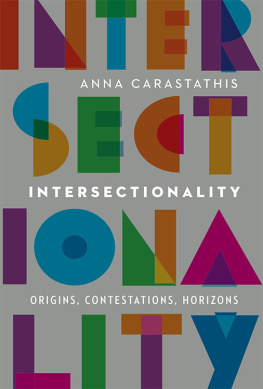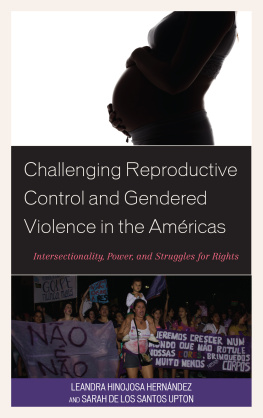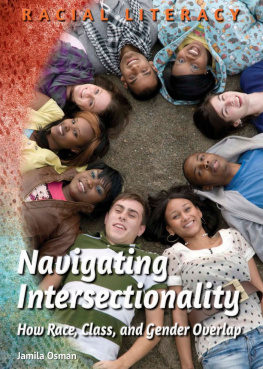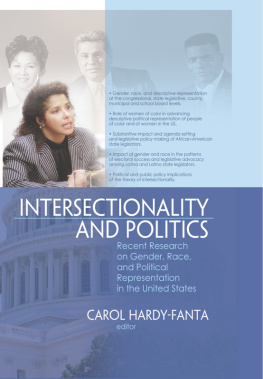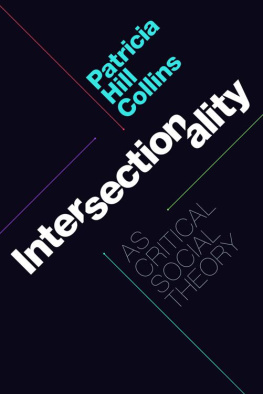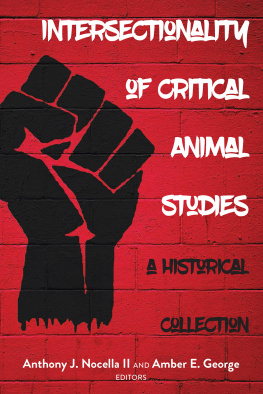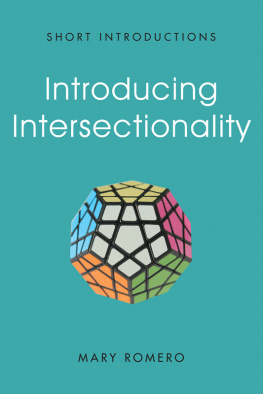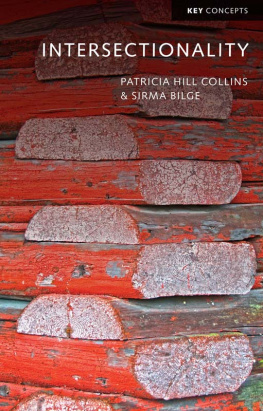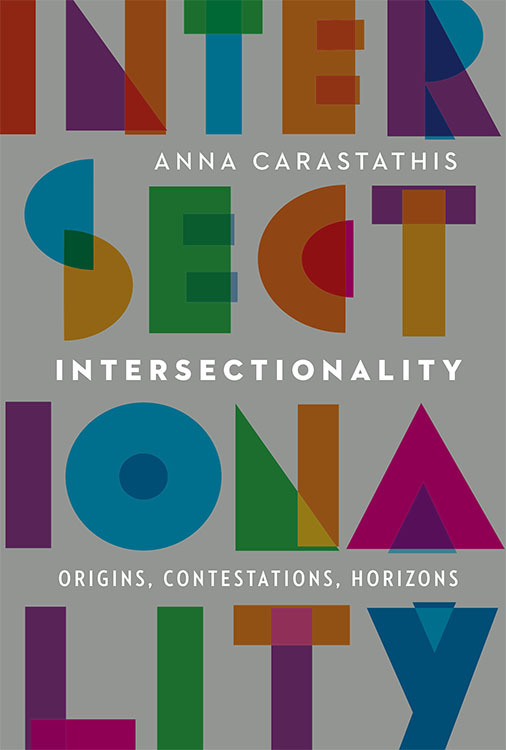Anna Carastathiss careful and sustained engagement with Kimberl Crenshaws work is uniquely illuminating and helpful.
Zenzele Isoke, assistant professor of gender, women, and sexuality studies at the University of Minnesota and author of Urban Black Women and the Politics of Resistance
Karen J. Leong
Intersectionality
Origins, Contestations, Horizons
Anna Carastathis
University of Nebraska Press | Lincoln & London
2016 by the Board of Regents of the University of Nebraska
Cover designed by University of Nebraska Press.
Earlier portions of chapter 1 originally appeared as The Concept of Intersectionality in Feminist Theory in Philosophy Compass 9, no. 5 (2014): 30413. An earlier version of chapter 2 appeared as Basements and Intersections in Hypatia: A Journal of Feminist Philosophy 28, no. 4 (2013): 698715. Part of chapter 3 was originally published as Reinvigorating Intersectionality as a Provisional Concept in Why Race and Gender Still Matter: An Intersectional Approach, edited by Namita Goswami, Maeve ODonovan, and Lisa Yount (London: Pickering & Chatto, 2014), 5970, used by permission from Taylor & Francis. A portion of chapter 5 originally appeared as Identity Categories as Potential Coalitions in Signs: Journal of Women in Culture and Society, special issue: Intersectionality: Theorizing Power, Empowering Theory, edited by Kimberl Williams Crenshaw, Sumi Cho, and Leslie McCall, 38, no. 4 (2013): 94165.
All rights reserved
Library of Congress Cataloging-in-Publication Data
Names: Carastathis, Anna, 1981
Title: Intersectionality: origins, contestations, horizons / Anna Carastathis.
Description: Lincoln: University of Nebraska Press, 2016. | Series: Expanding frontiers: interdisciplinary approaches to studies of women, gender, and sexuality | Includes bibliographical references and index.
Identifiers: LCCN 2016010867 (print)
LCCN 2016034740 (ebook)
ISBN 9780803285552 (hardback: alk. paper)
ISBN 9780803296626 (epub)
ISBN 9780803296633 (mobi)
ISBN 9780803296640 ( pdf)
Subjects: LCSH : Feminist theory. | Womens studies. | Women, Black. | African AmericansRace identity. | BISAC : SOCIAL SCIENCE / Feminism & Feminist Theory. | SOCIAL SCIENCE / Ethnic Studies / General.
Classification: LCC HQ 1190 . C 374 2016 (print) | LCC HQ 1190 (ebook) | DDC 305.4201dc23
LC record available at https://lccn.loc.gov/2016010867
The publisher does not have any control over and does not assume any responsibility for author or third-party websites or their content.
To my sister, Katerina
and to my yiayia, Katerina
Contents
At its core, this is a book about reading and listening. At times, as I wrote it, I was not sure I wanted to advance an argument to the extent it required me to shift from reading and listening to writing and speaking, and in a sensesince the argument centrally concerns the politics of interpretation and representationto speaking for others. But since I have now done that, I want to preface what I have written with a story about the locus of enunciation of its author. The Cherokee-Greek writer Thomas King has said that the truth about stories is that thats all we are. I tell this story with trepidation, vulnerability and apprehension, knowing that stories are dangerous as much as they are wondrous; we can become chained to them, and they cannot be called back; once told, they are loose in the world (King 2003).
I was born in 1981, the same year Cherre Moraga and Gloria Anzalda first published This Bridge Called My Back: Writings by Radical Women of Color, across an ocean, on a different continent, probably in a different world. A decade later I would fly above that ocean and arrive on northeastern Turtle Island an immigrant. Still another decade would pass. In my early twenties, attending graduate school, I would come across this book for the first time in a university library (it would be none the worse for wear) in an attempt to educate myself with respect to women-of-color feminisms in an academic context where, to my disappointment and frustration, they were institutionally, disciplinarily, and phenomenologically underrepresented. Becoming absorbed in its pages, while still standing between the stacks, sweating in my winter parka (it would be winter in Montreal, Kanienkeh:ka-Mohawk territory), I would come across a passage. As my eyes passed over its lines, I would let out an audible gasp. It would be the first (and last) time I saw my ethnicity mentioned within a women-of-color feminist text. This was not an act of self-representation; neither was it, straightforwardly, an inclusionary gesture in the category. But it was a fleeting moment of visibility. In an essay titled I Paid Very Hard for My Immigrant Ignorance, which instantly captured my interest, Mirtha Quintanales writes with a lot of empathy and nuance about her Greek friend, a woman who does not quite fit, a queer figure whose ambivalent, ambiguous racializationwhite by U.S. Census standards, yet loud, aggressive, and very Greek identifiedrenders her an outsider to both hegemonic and minoritized racial groups. Quintanales reports: The Greek womans many attempts to connect with Third World lesbians and Women of Color... have been met with outright rejection, rejection she faces in white, mainstream lesbian/feminist circles as well. Clearly she does not fit there either (1983, 15051). I would slam the book shut, and then quickly open it again, reading and rereading these lines with astonishment, incredulity, confusion, and a strange mixture of pleasure and painthe pleasure of recognition, the pain that this recognition is one of rejection. I would never speak about it with anyone.
I would write a dissertation on intersectionality, questioning its efficacy as a multi-axial theory of oppression. The next decade, which brings me into the present, would be one of more relocations and dislocations, which entailed a great many opportunities to learn about what had become my object of study even if I would feel unable to avow it, at least aloud, as my subjective experience. This was a decade during which my NAFTA -facilitated crossing of the Canadian-U.S. border would transform me into a nonresident alien, who would be granted the privilege to teach philosophy and womens, gender, and sexuality studies at the Other state university in Los Angeles. Since my object is critical race feminisms and postcolonial, anticolonial, and decolonial thought, I would have many conversations about intersectionality, primarily with interlocutors who were positioned as my studentseven though I was keenly aware they were surely teaching me as much as, if not more than, I was themas well as with colleagues and friends who would either look upon me as a three-headed monster or as amusingly naive when I would question the self-evidence of the racialized perceptions and ideologies that, somehow, always seemed ready to hand. I would learn to distrust the most innocent of encounters, which I found myself constantly plumbing for undercurrents and blatant statements of racism, homophobia, misogyny. I would learn about the history and reconstitution of slavery in and through the prison-industrial complex; about the U.S. version of genocidal settler colonialism (no worse than the Canadian version that I had already encountered but to which I could never become accustomed); about internally colonized groups constructed as minorities on their own ancestral lands, even when they numerically predominate; about the criminalization of migration and the struggles to survive of people rendered illegal; about the naturalization of permanent war and the state of terror it inflicted on racialized religious groups within the national territory and abroad; about the solipsistic, assimilative arrogations of whiteness, and the ambitions of some to be absorbed within it. I would begin to deal with my own queerness, both sexual and racial. I think about the figure of the Greek woman in Quintanaless text. I do not experience rejection from women of color, but neither do I experience belonging. I feel I do not belong. I feel I do not have the right to belong. I begin to question my desire to belong, to distrust my thinking about my own identity; could the experience of ambivalence and ambiguity be just another instance of white evasion of responsibility? From what enunciatory location can I speak authentically and responsibly, and in what language? What am I doing on this continent? When I think of who and where I am, the words dislocation, displacement, and dispossession weigh on my mind. I start to feel that my very presence on these appropriated lands is untenable. I start to remember the first days after my arrival in a small city in northern Ontario, traditional territory of the Anishinaabe-Ojibwe people. I remember us silently sitting on the monkey bars with Thelma, a Native kid and an immigrant kid, the Anglo/white students spitting hatred at us, and feeling then, and now, that I should not want to belong here, that belonging was a trap. I wanted to go home. Almost twenty years later, though, a home place had ceased to exist for me.

